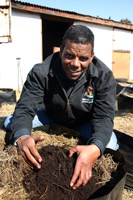
Top stories






More news


Marketing & Media
Ads are coming to AI. Does that really have to be such a bad thing?














Vermi Trade is an example of a small-medium enterprise (SME) that has taken advantage of this space, using a special type of earthworm to convert organic waste and then harvesting their excrement. With support from Sasol ChemCity, eco-entrepreneur Elwyn Pitt has developed a viable business model that is creating sustainable jobs whilst significantly reducing organic waste.
An environmentalist and innovator with a passion for youth development, it seemed just a matter of time before Pitt, managing director and founder of Vermi Trade, would be inspired to start a project that would contribute both to the environment and society. He started off by first researching opportunities in reducing waste to landfill and then went through the process of selecting cost-effective technologies with business potential. He soon came across vermiculture - the practice of breeding earthworms for their excrement (vermicast) which can then be used as an organic alternative to fertiliser. Pitt went on to develop a business model similar to the one currently used in India, where a central business hub sources its vermicast from a number of community SMEs that farm earthworms.
He explains that by adapting the model to South African conditions he has been able to solve a number of the key objectives of his eco-SME. "It's important that as an eco-entrepreneur you identify the problem statements you want to address upfront. In my case, these had to do with reducing organic waste to landfill, creating viable and sustainable jobs for youth living in rural communities and producing organic products that are healthy for both plants and the soil. Knowing these objectives has enabled me to establish my business in a way that addresses these issues. It has also meant that I can track the progress of Vermi Trade in terms of its success in achieving these objectives."
From an environmental perspective, the impact of Vermi Trade in the greater Johannesburg area is already significant: over eight million earthworms are fed using organic waste collected in and around Johannesburg. With a ratio of 50 000 earthworms to 1 500 litres of waste each month, Vermi Trade is currently reducing waste to landfill by 240 tons per month. And, because Pitt has specifically set up the operations near ready sources of organic waste, the business also has a very small carbon footprint as waste doesn't have to be transported long distances to reach the earthworms.
While Vermi Trade has already differentiated itself in the market thanks to its end-to-end product range (incorporating earthworms, worm factories, vermicast, potting soil and vermiliquid), perhaps the SME's greatest potential lies in its ability to create sustainable jobs in rural communities. Pitt has already established three enterprises with teams of young people. These are also SMEs with a difference. "I have deliberately chosen to partner with the youth concerned," explains Pitt. "This means that they are required to make a contribution to the project and invest in it themselves. In this way, they have a vested interest in the success of the enterprise from the beginning and are committed to making it work."